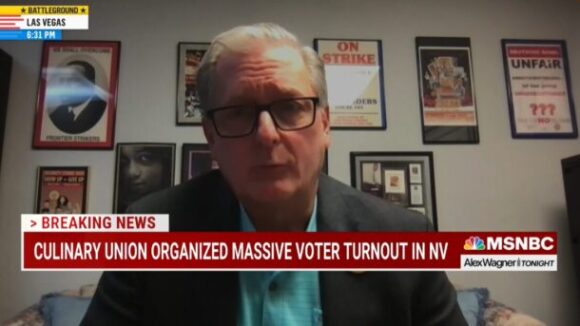Will Team Biden Weaponize Workers’ Pensions?
Big Labor abuse of worker pension and benefit funds as a means of advancing union bosses’ self-aggrandizing policy objectives is a familiar phenomenon.
National Right to Work President Mark Mix discusses union bosses’ efforts to hide their finances from their members:
The recent bitter contest for the presidency of the American Federation of State, County and Municipal Employees (AFSCME) afforded rank-and-file unionized workers a rare glimpse into the operations of this giant public-sector union.
Throughout the campaign, underdog Danny Donohue, chief of AFSCME’s largest local, based in Albany, N.Y., sharply criticized retiring AFSCME President of 31 years, Gerald McEntee, and, mostly by implication, AFSCME Secretary-Treasurer Lee Saunders, McEntee’s choice to take over the union.
Roughly two weeks before AFSCME members selected their next president on June 21, media outlets broke the news of McEntee’s costly peripatetic proclivities — including his frequent use of chartered flights to travel, at a cost of about $325,000 since 2010.
Donohue calculated that this news would not sit well with the clerical staff, probation officers, school bus drivers and other public servants whose contributions, voluntary and involuntary, have made the AFSCME union into a political powerhouse. The Donohue campaign reacted to the news by taking a dig at Saunders: “We think the secretary-treasurer should have stood up to the president and said this was inappropriate and in violation of policy.”
The Donohue team also sought to make an issue of “irresponsible” expenditures of AFSCME’s forced-dues treasury money.
“There’s a sense that AFSCME’s a sort of cash register for favored Democratic [Party] causes, but that’s not necessarily in the best interest of members,” the Donohue campaign told the Daily Caller in mid-June. Moreover, the union hierarchy persistently conceals how much of the money it extracts from workers ends up being funneled into Big Labor politics.
“A lot of members would have objected if they knew about it,” the unnamed Donohue campaign spokesman explained to the reporter. But “AFSCME tends to hide a lot of their finances on political spending and otherwise.”
Donohue’s focus on top AFSCME bosses’ expenditures of massive amounts of employee forced-dues money on lavish perks for themselves and political power grabs didn’t suffice to win him the union presidency. Lee Saunders carried the day with 54 percent of the vote.
It’s not that the union rank and file is content with the status quo. In fact, in late 2010 a scientific survey of union members nationwide conducted by veteran pollster Frank Luntz found that a whopping 72 percent think union bosses “. . . should be held more accountable to members.” A 60 percent majority opposed Big Labor’s political spending in the 2010 midterm elections, viewing it as a waste of their dues money to protect the union brass’s favored politicians.
The reason the campaigns of “insurgent” union officials for top national leadership positions rarely succeed isn’t because the charges they make against political-kingmaking incumbents don’t resonate with ordinary forced-dues payers. It’s because union members are, with ample justification, cynical about the actual prospects for change if the “insurgents” do take over.
Many a putative union “reformer” has been elected before, only to fail to change much if anything after taking a union’s reins.
A much more promising approach for making union officials more accountable to ordinary members and less eager to divert dues money into partisan politics is the elimination of federal and state labor-law provisions that authorize and promote compulsory union dues and fees.
The National Right-to-Work Act (S. 2173 and H.R. 2040), which is pending before Congress right now and will likely be voted on this summer, would help do just that.

Big Labor abuse of worker pension and benefit funds as a means of advancing union bosses’ self-aggrandizing policy objectives is a familiar phenomenon.

What impact does handing a union monopoly power to deal with your employer on matters concerning your pay, benefits, and work rules have on your pay?

Union bosses exploit hospitality workers for political campaigns, keeping them unemployed during COVID-19 lockdowns to use as electioneering foot soldiers.